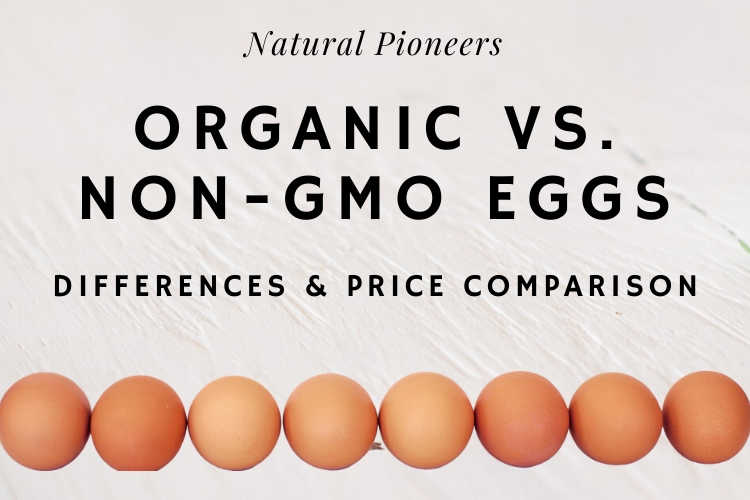
As an organic shopper myself, I have found myself reaching for Non-GMO eggs when organic eggs were out. After doing my research, I know that there are some commonalities, but major differences as well. Here’s what you need to know.
The difference between Organic and Non-GMO eggs is that, whereas both don’t use GMOs, Organic farmers additionally ensure the highest standard in animal welfare, prohibit the use of hormones and antibiotics, and take measures to protect the environment.
Those two labels stand for a whole lot more. Let’s take a closer look and find out.
1. Organic Vs. Non-GMO Eggs: What Do The Labels Stand For?
Let’s define what we are talking about:
Definition: Organic is a labeling term that indicates that the food or other agricultural product has been produced through approved methods. These Organic Standards describe the specific requirements that must be verified by USDA (United States Department of Agriculture).
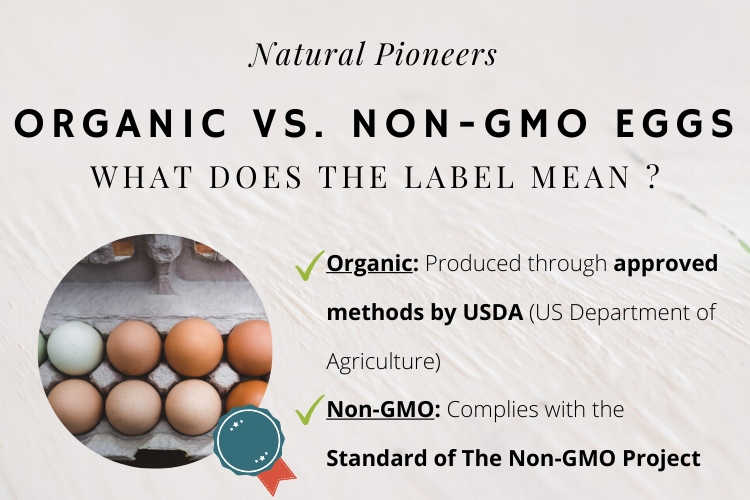
Definition: A GMO, or genetically modified organism, is a plant, animal, microorganism or other organism whose genetic makeup has been modified in a laboratory using genetic engineering or transgenic technology.
This creates combinations of plant, animal, bacterial and virus genes that do not occur in nature or through traditional crossbreeding methods.
The Non-GMO Seal complies with the Standards of The Non-GMO Project.
Let’s find out what these “Standards” mean for eggs.
Ever wondered what “organic” chicken means? Find out more: What Is Meant By Organic Chicken? 10 Facts And Prices
2. Organic Vs. Non-GMO Eggs: Which Is Healthier?
“The use of genetic engineering, or GMOs (genetically modified organisms), is prohibited in organic products. This means an organic farmer can’t plant GMO seeds, an organic cow can’t eat GMO alfalfa or corn, and an organic soup producer can’t use any GMO ingredients.”
United States Department of Agriculture | National Organic Program | Agricultural Marketing Service
To be clear, no genetically engineered chicken is on the market. However, conventionally raised chickens eat genetically modified grains such as corn and soy.
Four current studies reveal the impact of organics and Non-GMO eggs on human health:
- Studies indicate some differences in favor of organic food, including indications of beneficial health effects. Organic foods convey lower pesticide residue exposure than do conventionally produced foods, but the impact of this on human health is not clear. [1]
- A meta-analyses based on 343 peer-reviewed publications indicates that organic crops, on average, have higher concentrations of antioxidants, lower concentrations of Cadmium (known to cause cancers) and a lower incidence of pesticide residues than the non-organic comparators across regions and production seasons. [2]
- 7 studies in humans and 223 studies of nutrient and contaminant levels in foods lack strong evidence that organic foods are significantly more nutritious than conventional foods. Consumption of organic foods may reduce exposure to pesticide residues and antibiotic-resistant bacteria. [3]
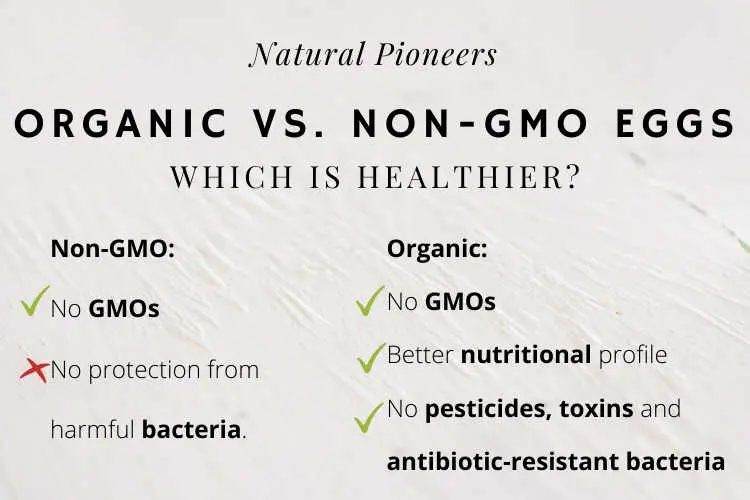
- Low doses of antibiotics used routinely in food-producing animals (such as meat, egg or milk-producing animals) favor emergence of resistant bacteria in animals. Resistant bacteria can be transferred to humans through (…) consumption of meat, eggs and milk with resistant bacteria. [4]
- According to a study by Mother Earth News, pasture-raised hens might make the difference. Compared to commercial eggs, eggs from hens raised on pasture may contain: [5]
- 1/3 less cholesterol
- 1/4 less saturated fat
- 2/3 more vitamin A
- 2x more omega-3’s
- 3x more vitamin E
- 7x more beta carotene
- One study found significant increases in growth rate, serum cholesterol levels and imbalances in serum steroidal hormone levels. The study suggests that the intake of commercial chicken feed and commercial chicken meat may be the potential cause of development of polycystic ovary syndrome in females due to steroid hormonal imbalance. [6]
- One review based on organic management practices in the EU concludes that organic food consumption may reduce the risk of allergic disease and of overweight and obesity. Of concern is the prevalent use of antibiotics in conventional animal production as a key driver of antibiotic resistance in society. [7]
It is crucial to understand that while most of the above studies are found to be true for dairy and meat, the impact on eggs might be different.
Conclusion: Organic eggs are Non-GMO by default. Organic eggs might have a better nutritional profile over only Non-GMO eggs. In addition, eggs with the Organic Label also protect consumers from exposure to pesticide residues, toxins like Cadmium and antibiotic-resistant bacteria. The Non-GMO standard does not protect consumers from such harmful bacteria.
3. Organic Vs. Non-GMO Eggs: How Are Chickens Being Treated?
The Non-GMO label imposes rules on the chickens feed. There are no further rules on the living conditions for poultry.
The vast majority of egg-laying hens in the United States are still confined in battery cages. Whereas Non-GMO-pasture-raised or Non-GMO-free-range eggs certainly come with better conditions for the animals the USDA Organic requirements for animal welfare are the most extensive.
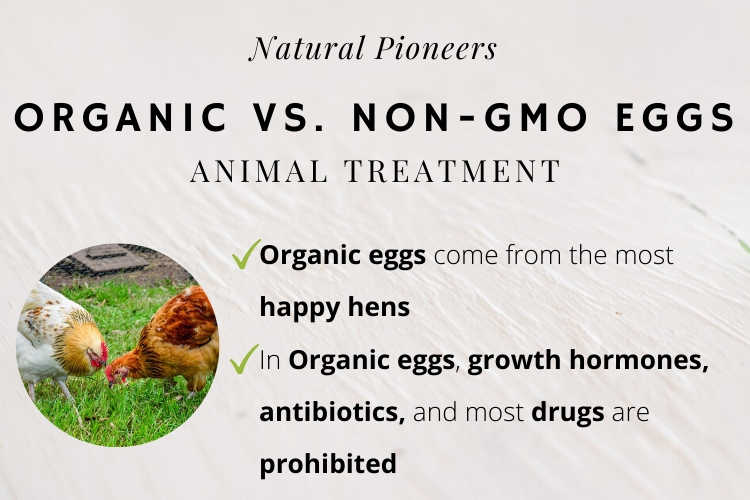
All USDA certified organic farms and businesses are required to provide living conditions for poultry that accommodate the health and natural behavior of animals. This includes:
- No use of genetic engineering, ionizing radiation, or sewage sludge
- Managed in a manner that conserves natural resources and biodiversity
- No use of hormones to promote growth or antibiotics for any reason
- Raised per the National List of Allowed and Prohibited Substances
- Overseen by the USDA, meeting all USDA Organic Regulations
- Feed products must be 100% organic, but they may also provide allowed vitamin and mineral supplements
- Preventive management practices must be used to keep animals healthy. Producers may not withhold treatment from sick or injured animals (animals treated with a prohibited substance may not be sold as organic)
- All organic livestock must have access to the outdoors year-round. Animals may only be temporarily confined due to documented environmental or health considerations
- Organic farmers cannot routinely use drugs to prevent diseases and parasites. Only a few drugs, such as vaccines, are allowed. Pain medication and dewormers (for dairy and breeder stock) are examples of allowed animal drugs.
Conclusion: Whereas consumers can find Non-GMO certified eggs with good living conditions for the hens (free-range, pasture-raised etc.), the USDA Organic Requirements are way more extensive. Furthermore, USDA Organic labeled eggs come from hens without growth hormones and antibiotics.
4. Organic Vs. Non-GMO Eggs: Impact On The Environment
Since 1996, farmers have fed genetically modified grains (corn) and oilseeds (soybeans) to their flocks and herds, with U.S. government oversight.
GMOs have caused herbicide tolerance which in turn required higher doses of toxic herbicides.
One of them, Roundup® for example, has a key ingredient (herbicide glyphosate) which according to WHO (World Health Organization) is “probably carcinogenic (cancer causing) to humans.”
Both, the USDA Organic and the Non-GMO Standard prohibit the use of GMOs.
Thereby they help avoid the growth of “superweeds” and “superbugs,” and protect the environment from these novel organisms in the first place.
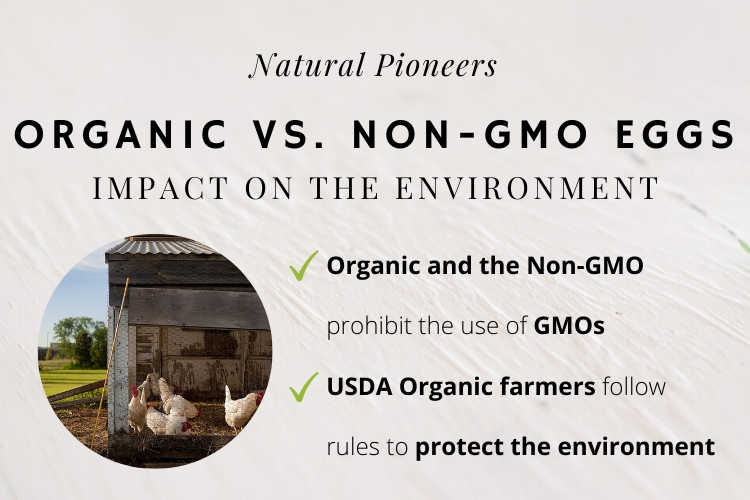
“Organic producers rely on natural substances and physical, mechanical, or biologically based farming methods to the fullest extent possible.”
Miles McEvoy, National Organic Program Deputy Administrator in Health and Safety
The USDA Organic Regulations describe organic agriculture as the application of a set of cultural, biological, and mechanical practices that support the cycling of on-farm resources, promote ecological balance, and conserve biodiversity.
In addition to prohibiting the use of GMOs, organic farmers and ranchers use practices that minimize impacts to the off-farm environment.
They implement plans to avoid manure runoff, instead using manure as fertilizer or composting it to conserve nutrients.
They also use sustainable practices such as crop rotation and cover crops to maintain soil fertility and protect soil and water quality.
Conclusion: Both, the USDA Organic and the Non-GMO Standard prohibit the use of GMOs. Furthermore, USDA Organic farmers need to comply with a multitude of additional regulations in order to minimize impacts to the off-farm environment.
Ever wondered what “natural” yogurt means? Find out more: What’s The Price Of Natural Yogurt? Buyer’s Guide & Prices
5. Organic Vs. Non-GMO Eggs: Price Comparison
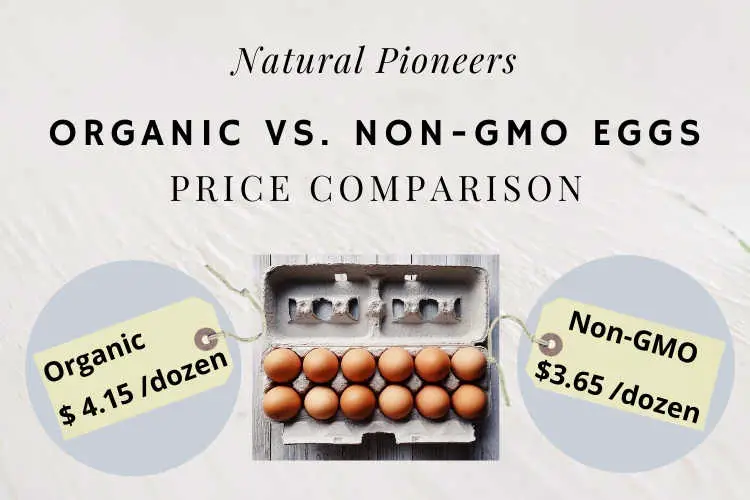
Both, USDA Organic, and the Non-GMO standard have higher production cost than conventional eggs producers.
Feed is the greatest expense in any poultry operation, regardless of whether it is conventional or organic. Organic grain prices are typically double or triple the price of conventional grains.
In addition, USDA Organic certified chickens eat more of their expensive organic feed. They are typically larger hens that have greater feed consumption than their cage counterpart. In addition, raising chickens free-range is less cost effective and more labor intensive than keeping the hens caged in small boxes.
Non-GMO certified eggs cost more than conventional (“regular”) eggs. The chickens are fed Non-GMO feed which is more expensive than the feed used in conventional farming.
On average, USDA Organic eggs cost $4 to $7 per dozen. That is 33 cents up to 58 cents per egg.
Non-GMO eggs are priced between $3.65 and $6 per dozen. That is 30 cents up to 50 cents per egg.
| Non-GMO Eggs | USDA Organic Eggs | |
| Average Cost Per Dozen | $ 3.65 | $ 4.15 |
| Average Cost Per Egg | 30 cents | 34 cents |
Conclusion: Both, USDA Organic and the Non-GMO standard are more expensive than conventional (“regular”) eggs. On average, USDA Organic eggs cost $4 to $7 per dozen. Non-GMO eggs currently range from $3.65 to $6 per dozen.
Sources:
- https://www.usda.gov/media/blog/2012/03/22/organic-101-what-usda-organic-label-means
- https://www.usda.gov/media/blog/2016/07/22/understanding-usda-organic-label
- https://www.ams.usda.gov/sites/default/files/media/Organic%20Production-Handling%20Standards.pdf
- https://www.ams.usda.gov/sites/default/files/media/Can%20GMOs%20be%20Used.pdf
- https://www.ams.usda.gov/sites/default/files/media/Organic%20Livestock%20Requirements.pdf
- https://www.ams.usda.gov/sites/default/files/media/Organic%20Production-Handling%20Standards.pdf
- https://www.ams.usda.gov/sites/default/files/media/NOP-Biosecurity-FINAL.pdf
- https://www.ams.usda.gov/grades-standards/organic-standards
- https://www.bestfoodfacts.org/egg_milk_allergies_gmos-2/
- www.ams.usda.gov/organicinfo
- https://nestfresh.com/about/egg-school-faq/
- https://www.nationalchickencouncil.org/genetically-modified-organism-gmo-use-in-the-chicken-industry/
- https://www.nongmoproject.org/gmo-facts/
- https://www.ams.usda.gov/sites/default/files/media/Organic%20Practices%20Factsheet.pdf
- https://www.nongmoproject.org/gmo-facts/what-is-gmo/
- https://www.nativesunjax.com/newsandevents/organic-vs-non-gmo-is-there-a-difference
- https://www.ams.usda.gov/sites/default/files/media/LivestockProducersGuide.pdf

